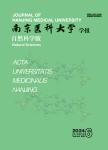Pathological and biochemical alterations of astrocytes in ovariectomized rats injected with D-galactose: A potential contribution to Alzheimer's disease processes
Pathological and biochemical alterations of astrocytes in ovariectomized rats injected with D-galactose:A potential contribution to Alzheimer’s disease processes出 版 物:《南京医科大学学报(自然科学版)》 (Journal of Nanjing Medical University(Natural Sciences))
年 卷 期:2008年第5期
页 面:574-574页
学科分类:1002[医学-临床医学] 100203[医学-老年医学] 10[医学]
主 题:Alzheimer’s disease astrocytes estrogen deprivation oxidative stress rats blood-brain-barrier senile plaques estrogen mice neuroprotection expression cortex acetylcholinesterase neurodegeneration innervation
摘 要:Astrocytes are implicated in the pathological changes of Alzheimer s disease. Our previous studies have demonstratedthat estrogen deprivation and oxidative stress act synergistically to accelerate0 the progress of Alzheimer s disease. Long-term D-galac-tose injection combined with ovariectomy may serve as a rodent model for Alzheimer s disease. To address the potential contributionof astroglia to the Alzheimer s disease pathogenesis, we investigated pathological and biochemical alterations of astrocytes under thisanimal model. Ovadectomized rats injected with D-galactose for 2 weeks showed extensive localization of glial fibrillary acidic proteinimmunoreactive astrocytes and slightly elevated glutathione levels in the hippocampus without significant impairments in the watermaze test and deficits of the cholinergic analyses, compared to the saline-injected rats. Ovariectomized rats injected with D-galactosefor 6 weeks, however, exhibited degeneration of astrocytes and decreased glutathione levels in the hippocampus, accompanied withsevere dysfunction of behavioral test and deficiency of cholinergic terminals. Electron microscopy further confirmed the pathologicalchanges of astrocytes, especially in the aggregated area of synapse and brain microvessels. Consistent with degeneration of perivascu-lar astrocytic endfeet, analysis of the horseradish peroxidase demonstrated an impairment of the blood-brain barrier *** findings indicate that biochemical and pathological alterations of astrocytes may partially contribute to exacerbating neuronaldeficits in the course of Alzheimer s disease. Restoring neuroprotective potential of astrocytes may be a useful therapeutic target forAlzheimer s disease and other neurodegenerative diseases.



